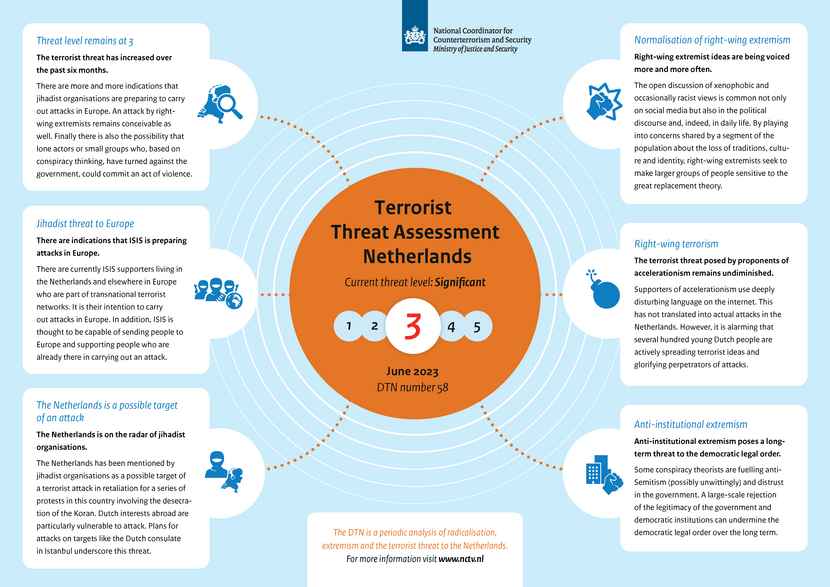NCTV’s Terrorist Threat Assessment 58: increased terrorist threat to the Netherlands
The terrorist threat to the Netherlands has increased over the past six months. There are more and more indications that jihadist organisations are preparing to carry out terrorist attacks in Europe. These groups have explicitly referred to the Netherlands as a target. A terrorist attack by right-wing extremists remains conceivable as well. Finally there is also the possibility that lone actors or small groups who, based on conspiracy thinking, have turned against the government, could commit an act of violence. These are some of the main conclusions of the recent Terrorist Threat Assessment for the Netherlands (DTN 58), which is produced by the National Coordinator for Counterterrorism and Security (NCTV). The threat level is currently 3 (on a scale of 1 to 5). This means that it is conceivable that a terrorist attack could occur in the Netherlands.
Jihadism
Last year saw an increase in the threat to Europe posed by ISIS. Starting around the second half of 2022, more and more indications have emerged that ISIS is planning on carrying out attacks in Europe. The threat mainly comes from networks directed by ISIS structures in Syria and Afghanistan and related ISIS networks in Türkiye. For some time now, global jihadist organisations have regarded the Netherlands as a legitimate target for an attack. As a result of recent incidents in this country involving the desecration of the Koran, the Netherlands now has a higher profile among such organisations. Various pro-ISIS channels have taken to social media to call for retaliation against Western countries, including Sweden (which is mentioned by name) and, to a lesser extent, the Netherlands. Dutch interests abroad are particularly vulnerable to attack.
The assessment of the Dutch jihadist movement has stayed unchanged for several years; its size has remained stagnant. In several larger cities in the Netherlands there are a number of networks of various sizes that support jihadist ideology. The networks are in contact with one another and they exchange ideas. The movement is both ideologically and socially fragmented, which has prevented it from operating effectively and increasing its influence. With ISIS defeated in Syria and Iraq, the movement has also lost an important narrative, and as a result, it is struggling to attract new members or secure the ongoing commitment of existing members. It is estimated that around 500 men and women in the Netherlands embrace this ideology. Although there has been some turnover within the movement in the past few years, it is not expected to grow in either size or strength in the short term.
Right-wing extremism
Over the past few years the right-wing extremist threat, including right-wing terrorism, has become more diffuse and unpredictable. This applies to both the Netherlands and other Western countries. A minority of right-wing extremists pose a violent threat. Another segment of this group is actively working to normalise their intolerant, extremist ideas in politics and society.
Within the Netherlands the main threat of right-wing extremist violence comes from online supporters of accelerationism and similar right-wing terrorist ideas. Accelerationism is based on the great replacement theory. There are probably a few hundred Dutch-speaking supporters of these ideas. This number does not seem to have increased in the past year. There are concerns about a further normalisation of right-wing extremist ideas in politics and society.
Over the past six months it has become increasingly common to hear right-wing extremist ideas being voiced in public. The open and virtually uncritical discussion of xenophobic and occasionally racist views is common not only on social media but also in the political discourse, the public broadcasting system and, indeed, in daily life. The slogans projected on the Erasmus Bridge in Rotterdam on New Year’s Eve illustrate the desire to normalise right-wing extremism.
Anti-institutional extremism
The threat posed by anti-institutional extremism in the Netherlands is twofold. In the short term, there is a limited threat of violence; over the longer term, anti-institutional extremism can undermine the democratic legal order. Some conspiracy theorists fuel distrust in the government by propagating the narrative of a malevolent elite. Their sometimes highly intimidating stance towards politicians can seriously hamper the latter in performing their democratic duties. The ‘sovereign citizen’ movement is part of the larger anti-institutional milieu. On the basis of conspiracy theories they deny the legal and democratic legitimacy of the government. Anti-institutional extremism is principally a threat to the democratic legal order. There is also the possible threat of violence.
Documents
-
Terrorist Threat Assessment for the Netherlands 58
On the basis of the 58th edition of the Terrorist Threat Assessment for the Netherlands (DTN), the threat level has been set at ...
-
Infographic Terrorist Threat Assessment for the Netherlands 58
The DTN is a periodic analysis of radicalisation, extremism and the terrorist threat to the Netherlands.
